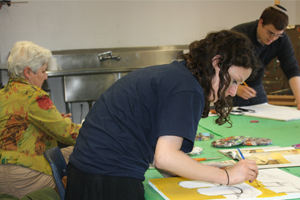Honors curriculum could replace all APs

HONORS: Art teacher Roen Salem, left, is designing a new Honors Art course to replace AP Art next year.
June 29, 2012
Shalhevet will begin evaluating its curriculum next year in hopes of eventually eliminating and replacing AP courses according to Acting General Studies Principal Mr. Roy Danovitch.
While only AP Art will be affected next year, the administration plans to conduct a formal review of AP classes in order to ultimately replace them with an independent honors curriculum, to be known as “SAS” courses for “Shalhevet Adanced Studies.”
“In three years, I would hope that we can replace APs with an independent advanced curriculum,” Mr. Danovitch said. “Students would still get the same GPA boost, but it would allow our course offerings to expand and be more unique.”
These replacement courses would require prerequisites, and therefore would only be offered to juniors and seniors, as APs are now. Mr. Danovitch hopes that the change will switch classes from being “lecture-based” and directed towards a test to more based off of the love of learning.
Student reaction was mixed.
“I take APs because I want an advanced placement class,” said senior Leah Katz. “I do not care about the AP tests. If the school wants to eliminate AP courses and replace them with something better, that’s good.”
Junior Shayna Gersten disagreed,
“I take APs because I want to earn credits on the AP exam so I can already fulfill some units for college,” she said. “I don’t think it’s a good idea to replace APs because I personally think it enhances the school to have APs.”
However, the College Board allows students students to sign up for an AP exam whether or not they take the official AP course. For example, Shalhevet students take AP English Language exam without taking a course by that name.
“Most independent schools are starting to change their curriculum,” Mr. Danovitch said. “They are realizing that they can’t be truly independent with a third party determining the classes.”
Among schools that have gradually been eliminating AP courses are Crossroads, Ramaz in New York, and the Scarsdale School in Westchester County, NY, another Just Community school, he said.
College counselor Dr. Steven Mercer was neutral about the change, but said it shouldn’t be detrimental for students when they apply to college.
“It’s neither good nor bad,” Dr. Mercer said. “On the one hand, there is no question that the APs are important for some selective universities, but it’s not the APs themselves that colleges are relying on.”
He said it would be important for the new honors courses to be as serious as APs.
“Colleges just want to be confident that a student is taking challenging courses,” Dr. Mercer said. “If a high school can show that students took courses that are not APs but are challenging in other ways, I don’t know of one college that would hesitate to accept that student.”
Among teachers, the opinion about AP courses seemed to depend on the academic department. Math teachers seem to like APs the best, while others have a more complicated view.
“I like teaching APs from the point of view of the students who take it and the subject matter,” said Mrs. Tove Sunshine, who teaches two APs, Euro and Psych.“But I don’t like the pace. The schedule makes it difficult to do in depth learning.”
Mrs. Sunshine said that if the school could prepare replacement, but equally advanced courses, she would support the transition from APs to an independent advanced curriculum.
However, AP Calculus teacher Ms. Tamara Gidananian would rather keep the AP math classes. She said that as long as the classes are created based on student capability the material is not too overwhelming.
“I think we shouldn’t get rid of AP classes for math, because math is something that is sequential,” Ms. Gidanian said. “AP Calc prepares students for college, especially if they want to major in math or economics.
“Having AP Calculus in high school is a real help,” she continued. “If students are placed in the right class based on abilities, it’s not too much. But if students are not placed based on their abilities, then it causes a problem.”
For Mr. Danovitch, the only negative about eliminating APs is the challenge of convincing the community.
“The process of educating people is the only downside,” Mr. Danovitch said. “But with time, more and more parents are seeing the value and more college admissions officers are advocating for it.”
Meanwhile, before the entire AP curriculum is eliminated, smaller changes will be made to the course offerings.
First, AP Studio Art will be replaced next year by an Honors Art class designed by Art and Performing Arts Department chair Roen Salem (see related story, Page XX).
There may also be a non-AP psychology course offered next year in addition to the AP Psych class. Because of its popularity, AP Psych is the only other class besides for AP Art that has more than one class.
The non-AP psychology class would likely use the same textbook, but AP Psych teacher Mrs. Sunshine would pick and choose the material that she would teach.
“Some students are genuinely interested in Psych but don’t take the class because they don’t want the fast pace,” she said. “It seems like a good option to offer rather than force them to have to take the AP if they want to learn about the material.”












